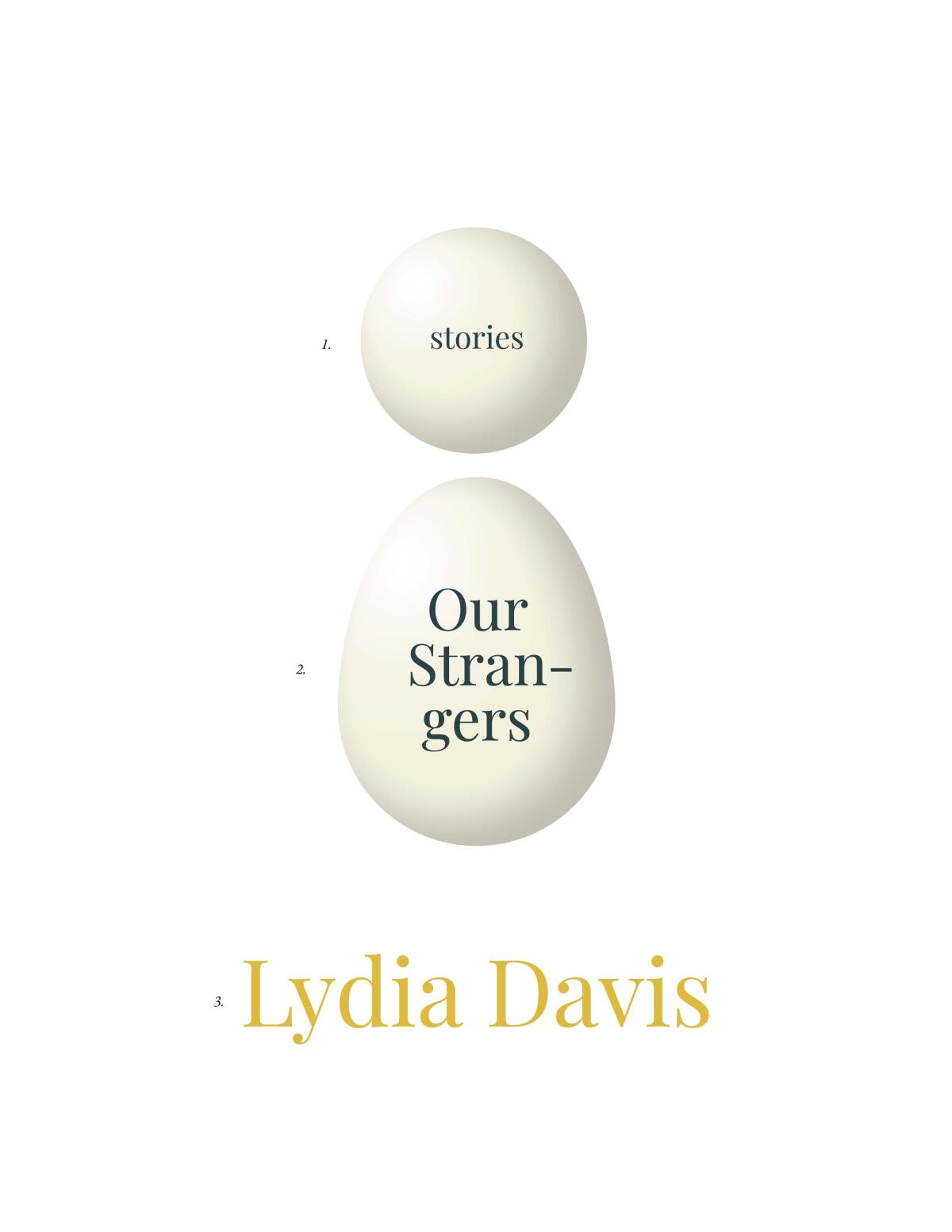How to skewer life’s absurdities while thumbing your nose at Amazon

- Share via
Review
Our Strangers: Stories
By Lydia Davis
Bookshop Editions: 304 pages, $26
If you buy books linked on our site, The Times may earn a commission from Bookshop.org, whose fees support independent bookstores.
Here are some words in Lydia Davis’ new collection of stories, “Our Strangers,” that she finds particularly interesting: “bibelot,” “egg,” “acknowledgment,” “fun,” “obnoxious,” “crepey,” “irregardless.” Also: “interesting.” Davis, a meticulous fiction writer and an acclaimed translator, observes words with care and bemusement, tuned to the way different contexts alter their sound and meaning, sparking confusion or humor or heartbreak.
That’s nothing new: For decades, Davis has specialized in aphoristic stories that thrive on wordplay, rhythm and irony while avoiding easy sarcasm or dad jokes. Here, for instance, is the full text of “Two Drunks at Dinnertime” in her new collection: “She was a little drunk cooking dinner, and burned everything. He was a little drunk eating it, and didn’t care.” The repeated words, the way the clauses comically bounce off the commas — she’s as careful with these things as writers get.
“Fulfillment: Winning and Losing in One-Click America” is a sweeping and sobering indictment of the effect of Amazon on a country fraying at the seams.
The difference in “Our Strangers” is twofold. First, it’s an overt critique of big-box bookselling. It’s the first title from Bookshop Editions, a publishing arm of Bookshop.org, a collective of independent booksellers with whom The Times has an affiliate relationship. Available solely at indie bookstores and libraries, the book reflects, as mentioned in an introductory note, her “wishes to see book-lovers return to the place where books have been sold with care and thoughtfulness for centuries by dedicated fellow-book lovers — the corner bookshop.”

The other difference is that since the publication of her previous collection, 2014’s “Can’t and Won’t,” Davis has done much to demystify her process. Her delightful 2019 collection, “Essays One,” is rooted in craft essays explaining how she addresses words and structure. Such pieces are often tedious laments or lectures mainly of interest to MFA students. Davis’ thoughts on craft, by contrast, are accessible and great fun. Across three pages she explains how she turned a random email into the one-page story “Nancy Brown Will Be in Town.” A tweak here gives the story a singsong rhythm; a shift there adds a note of absurdism. She kept the word “ottoman” because it “reminds me of the Ottoman Empire and sounds so very elevated for a piece of furniture.”
However strange the process, there’s plainly pleasure in it for her, and that feeling is infectious across “Our Strangers.” Sometimes she contemplates the oddness of particular terms, like the “surround” of a bathtub, or the caramel “drizzle” on a coffee drink. Sometimes she zooms in on how absurd a “realistic” sentence can sound. (“‘Damn you!’ she cries out to the chicken.”) In a story about a neighborhood online group, she exposes the weirdness of what we ask from the world (“Wanted: rubber ducks. I will pick up.”) and the kind of faux-polite rhetoric we use around those offerings. (“Pork butts claimed. Thanks, guys!”)
Some of the stories are overtly about writing and revision. One story about an overheard conversation at a party is followed by a shorter version of it. Davis writes a paragraph-long riff on Indonesian vegetables and a separate commentary on how exacting she was about identifying the two vegetables in the original piece. In “Winter Letter,” a mom drones on about applesauce, a rained-out vacation trip and a library exhibit of aprons.
‘Can’t and Won’t’ by Lydia Davis is a collection of short stories that ask readers to reconsider what we think we know about a story, how it operates, what it does.
Boring? Well, boredom is, in its own way, interesting. Otherwise, why would we read so much domestic fiction? Davis is keying in on something more specific: the disconnect between how a speaker and receiver grasp the world, how we strive to keep others’ attention to our silly little anecdotes. If the mom wants a deeper connection with her children, why isn’t she getting it? Why does she feel a tale of applesauce will close the gap?
Davis takes story seriously because she’s alert to how conventional storytelling disappoints us. For her, a clear arc always has to confront the world’s absurdity. “Our Strangers” is interspersed with thematic stories about tenuous connections to famous people, marital spats and misunderstandings. In such minor dramas, we get a little closer to the shape of everyday life. Fuss over the details and even the mundane becomes, as the Mom in “Winter Letter” keeps insisting, interesting.
Davis’ fussiness evokes watchmakers or jewelers, but those analogies miss her humor. Indeed, her MO is a little closer to Buster Keaton’s. His cinematic gags were often built on the careful assemblage of a host of pieces that sometimes resolved in catastrophe, sometimes meshed delightfully. Either way, they’re beautifully choreographed, braiding attentiveness with a sense of the surreal. It’s the same for Davis: For all her concern with specificity and exactitude, her stories are usually set in moments where imprecision and confusion rule.
The 13 most essential L.A. works of short fiction, from a Little Tokyo proto-noir to Fitzgerald, Wodehouse, Bradbury and generations of Chicano pioneers.
That point is beautifully made in the final lines of the story “What I Understand.” The thesis is simple enough: It’s a mini-essay about how the author craves knowledge and feels she can grasp most concepts. But, she concludes: “I stumble in a few areas, I am lost in some fields.” It’s a funny image — after discussing abstract ideas, Davis wants us to imagine somebody clambering in a corn patch. But there’s some pathos there too: Here she is, letting us know that she, like us, is often lost.
Athitakis is a writer in Phoenix and author of “The New Midwest.”
More to Read
Sign up for our Book Club newsletter
Get the latest news, events and more from the Los Angeles Times Book Club, and help us get L.A. reading and talking.
You may occasionally receive promotional content from the Los Angeles Times.









